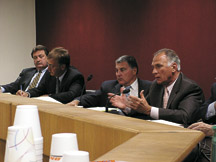The Secaucus Town Council is still not ready for its close-up.
Five months after a council subcommittee vowed that televised meetings were imminent, the governing body is still deadlocked about whether comments from the public should be taped and broadcast. The impasse now threatens to derail televised meetings in Secaucus indefinitely.
In neighboring towns like Hoboken and Bayonne full meetings are televised on cable without much fanfare.
Putting Secaucus meetings on the air was among the goals of the Take Back Secaucus slate of Michael Gonnelli, Gary Jeffas, and Bob Berckes when they ran for council in 2006.
Since joining two years ago, Jeffas and Gonnelli, along with Councilman John Bueckner, have tried to make televised council meetings a priority. In response, Mayor Dennis Elwell created a three-person subcommittee to explore how meetings can be televised.
“The impasse concerns whether we can televise meetings and include the public without getting into issues of defamation,” said Town Councilman John Shinnick, who is a member of the council’s Television Subcommittee.
Jeffas and Town Administrator David Drumeler are the other two members of the subcommittee. Jeffas, Gonnelli, and Bueckner favor taping full council meetings, including the “public comments” section of the meetings when residents get to speak for five minutes on any concern they have.
In other municipalities, public comments are usually included, but the town attorney generally stops any member of the public who veers into a possibly defamatory area.
Elwell, Shinnick, and Councilman John Reilly are open to taped meetings, minus comments from the public, because they want to focus on the business on the council.
Richard Kane, who last week resigned from the council, suggested taping the council’s caucus meetings, which are generally not attended by the public or local media. Caucus meetings give council members a chance to discuss in detail certain matters that will be on the agenda at the regular meeting. They do not include comments from the public.
Currently, the council is deadlocked 3-3 on the matter and may remain so until a replacement for Kane is selected.
Lawsuits a concern
“Mike, John, and I wanted to tape meetings in their entirety, because we wanted the public to feel that their comments are just as important as ours,” Jeffas said.
Not surprisingly, the inclusion of public comments is important to residents who regularly attend council meetings.
“How can you leave out the public comments? That’s like leaving out half of a conversation,” said Tom Troyer when interviewed about televised meetings last fall. “Sometimes, the most meaningful information only comes out because of a comment or question from the public.”
Televised meeting are also important to seniors who may have difficulty getting to the Municipal Center.
Since the town likely won’t have the resources to edit raw footage, Shinnick and others said they are concerned about slander, libel, and lawsuits.
“If a resident gets up and says, ‘You’re a [thief],’ If that’s a false statement, do you put that on television?” Shinnick asked. “If someone says, ‘You’re a crook,’ do you put that on television? My question is, what do you put on, what do you not put on, and what’s your justification for each one?”
Televised meetings in Hoboken and Jersey City
Secaucus isn’t the first municipality to face these questions. Jersey City avoided the defamation issue altogether by only taping and airing its City Council caucus meetings. In Hoboken, where the full City Council meeting is taped and aired, officials have erred on the side of free speech.
“I’ve been involved in some heated exchanges over the last couple of meetings, and having a camera in the room can easily be exploited,” said Hoboken Councilwoman Terry LaBruno, who sponsored the resolution for televised meetings in that city. “But it’s one of the best things I did and I don’t regret it. That’s what legislation and politics is sometimes about. How can you keep what you’re doing from the public? People have a right to know what’s going on. I don’t think the Secaucus councilpersons have any choice but to videotape their meetings.”
Acceptable compromise?
Jeffas has proposed a compromise, which the governing body is expected to discuss at its caucus session this week.
Under his proposal, the council would modify the way it runs meetings to accommodate public comments after each ordinance or resolution is introduced. Residents would only have the opportunity to speak about the specific resolution being introduced to avoid comments about matters that are not on the council agenda.
“There are a few towns that do their public comments that way,” Jeffas noted.
Shinnick indicated this compromise might be acceptable to the other side.
“I’m not trying to be an obstructionist,” he said. “I think we’re all looking for some resolution that makes this work. Hopefully we can come up with a resolution that everyone can agree to.”
